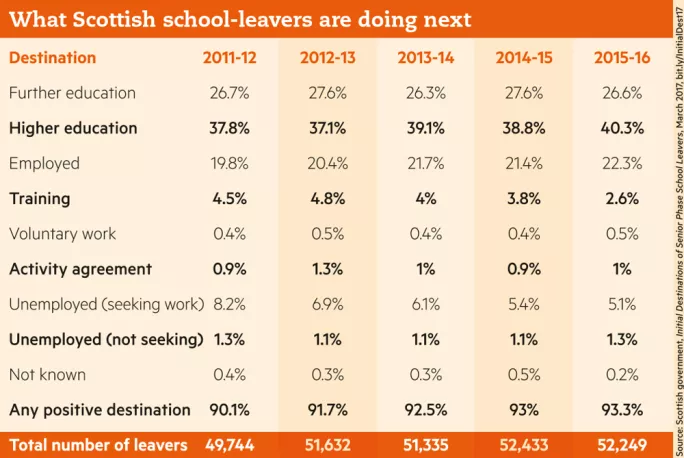FE entries dip as HE drives ‘positive destinations’ rise

Pupils must not be “pressured” into following a specific path, student representatives have warned, after a drop in the number of school-leavers entering further education.
Statistics published by the Scottish government reveal a record 93.3 per cent of pupils left the senior phase of school in 2015-16 for a “positive destination”: education, training or work. Overall, more than two-thirds (66.9 per cent) entered further and higher education at a Scottish college or university, a figure that has risen year-on-year since at least 2011-12.
‘Squeeze in part-time places’
But the proportion of senior school-leavers who went into FE, which makes up the majority of courses offered by Scottish colleges, has not risen along with the total; the figure dropped by 1 percentage point, from 27.6 to 26.6 per cent, between 2014-15 and 2015-16. In 2011-12, it stood at 26.7 per cent.
Vonnie Sandlan, president of the NUS Scotland students’ union, said the increase in the number of young people going on to positive destinations from school was encouraging, but it was important to look beyond the headline figures.
She added that the “squeeze” in parttime FE places had “undoubtedly had an impact on the overall number of students” and had disproportionately affected female, mature and disabled students.

Ms Sandlan said: “Our education system offers many excellent educational routes and our focus must be on ensuring that all students are entering the destination that is right for them, rather than any route they feel pressured into entering.
“This means that a student who wants to enter HE should be supported to get there, but equally, that any student who sees FE as right for them doesn’t feel forced into going into HE for any reason.”
The NUS would not be drawn further on where this pressure was coming from, but a spokesman said there was a “general trend that HE receives more attention than FE”.
‘Staying on at school’
In January, figures from the Higher Education Statistics Agency showed that - unlike the rest of the UK - the total number of enrolments on HE courses in Scotland rose slightly between 2014-15 and 2015-16, from 48,715 to 49,890.
Shona Struthers, chief executive of Colleges Scotland, said the reduction in young people choosing to study FE in colleges could be down to more pupils choosing to stay on at school until the sixth year and a greater number opting to go into HE.
She added that the fact that more young people had entered HE, including at colleges, “shows that colleges are increasingly being seen as a credible option, which gives people a real opportunity to gain the necessary skills to prepare them for work and their future careers”.
Within some more disadvantaged communities, access to FE-level study will continue to be crucial
Alan Sherry, principal of Glasgow Kelvin College, said that entry to FE-level study at college remained “the key point of access for many young people and, importantly, mature learners coming to tertiary education for the first time, either to gain appropriate vocational and employability skills or to upskill in their existing employment”.
He added: “Within some more disadvantaged communities, access to FE-level study will continue to be crucial.”
The warnings about the drop in FE enrolments come at a time when the sector is making headlines south of the border, after the Westminster government’s chancellor Philip Hammond announced the introduction of “T level” technical qualifications.
When last week’s figures were published, Shirley-Anne Somerville, Scotland’s minister for further and higher education and science, said she was “pleased to note that the proportion of school-leavers going directly into HE has reached its highest-ever level”. But she admitted that more had to be done to improve access, saying the government was taking forward the actions recommended by the Commission on Widening Access.
“It is essential that young people leaving school are able to make the most of the available opportunities and can make the choice that is right for them - whether that be university or college, training or a job,” she added.
You need a Tes subscription to read this article
Subscribe now to read this article and get other subscriber-only content:
- Unlimited access to all Tes magazine content
- Exclusive subscriber-only stories
- Award-winning email newsletters
Already a subscriber? Log in
You need a subscription to read this article
Subscribe now to read this article and get other subscriber-only content, including:
- Unlimited access to all Tes magazine content
- Exclusive subscriber-only stories
- Award-winning email newsletters